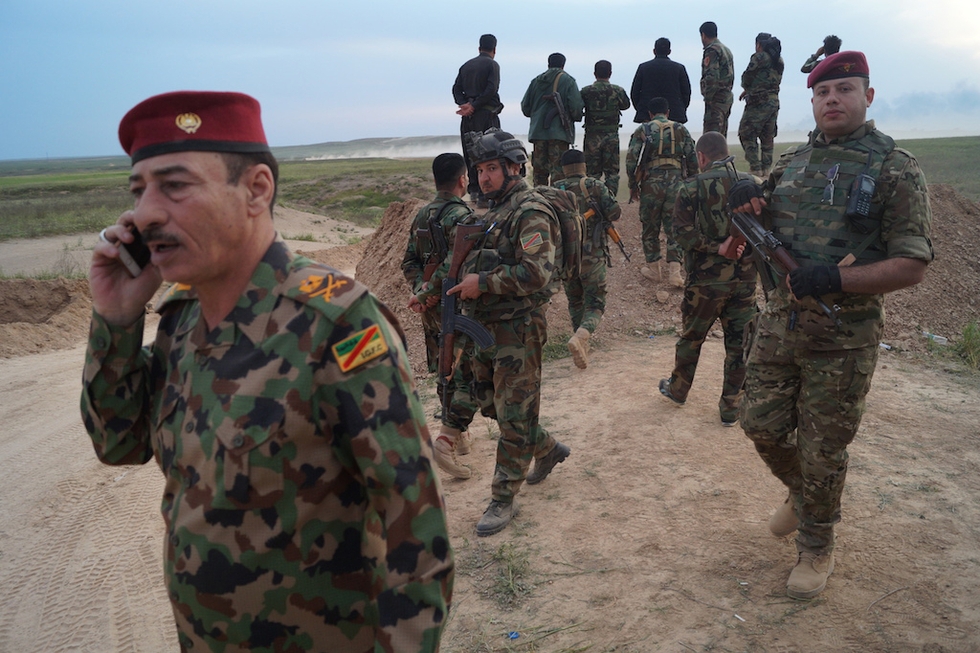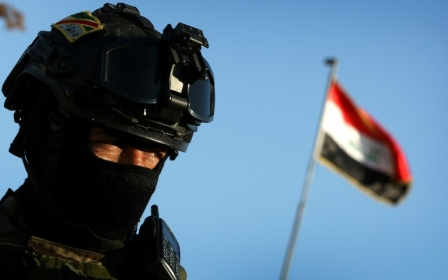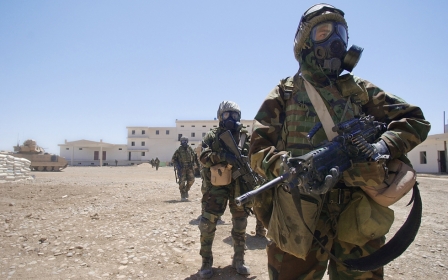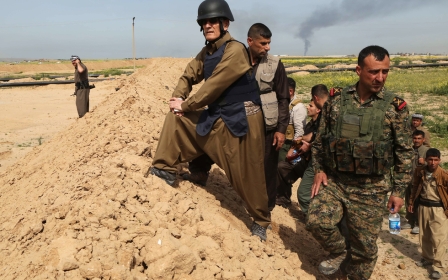IS snipers, suicide bombers and IEDs slow mission to capture Mosul

TEL REEM, Iraq – The air is thick with black smoke after, in a desperate attempt to shield themselves from US air strikes, Islamic state (IS) group fighters began burning fuel pits. Despite their efforts, the air strikes keep coming, with one after another thudding into their positions.
A drive which began on Thursday to retake Iraq's second city Mosul has seen Kurdish Peshmerga, the Iraqi army and some local tribes join forces in a battle that raged from early in the morning until late in the evening.
For security reasons, journalists are kept a few kilometres from the front lines, but even at a distance the heavy fighting is easy to observe. Occasionally, rapid heavy gunfire lit up the sky as the Iraqi army struggled to take villages in a mountainous part of Iraq that IS has held since it took swaths of the country in June 2014.
Arif Hussein Abas, a local officer of the Peshmerga's 15th division’s artillery division, told Middle East Eye that cynical defensive measures are currently the main problem facing anti-IS forces. “The Islamic state is not strong anymore, they just fight with snipers, IEDs [improvised explosive devices] and suicide bombers. That’s why the war is going slowly,” he said. “They cannot fight face to face any more.”
IS has employed the same strategy in other parts of Iraq in an attempt to bog down operations, making Iraqi security forces go house to house to clear out mines.
Peshmerga soldiers, who have been the most successful anti-IS force in Iraq, say they are frustrated with the slow rate of progress and make fun of the Iraqi army for not surging ahead more quickly.
“We could take these villages in two hours,” a Peshmerga soldier shouted to reporters.
But on a command level, unity between the two appears to be holding well.
"We have an agreement with the Iraqi army, and 15th division is attacking Qayara and Haji Ali,” Sheikh Ziryan Sheikh Hussein, a local Peshmerga commander, said. “We are not involved in this fight, but we are ready to help with anything.”
Local resentment
One of the reasons that Peshmerga fighters have not joined those battles is because they are often resented by the largely Sunni community in local villages.
The local Sunni Arab population is also hostile towards a group of Shia militias known as the Popular Mobilisation Forces (PMU) or Hasdh al-Shaabi in Arabic.
“The Hasdh [PMU] and Daesh [IS] come from the same source, and they have the same ideology,” said Abu Hassan, 52, who had fled the town of Baiji which was seized from IS by the mainly Shia militias.
“If you are Sunni, you are terrorist according to the Hasdh. Most of the Sunni people think we should be freed by the Mosul tribes, and Peshmergas,” he added.
Nicholas Heras, a Washington-based Middle East researcher at the Centre for a New American Security, told MEE that it would be a "challenge" to take the area because "the local population has a proud tradition of Arab nationalism, which also coexists uneasily with al-Qaeda local social networks in the city, and the Sunni Arab Moslawis will not accept Kurdish forces to be a long-term military occupier of their city".
While Heras said that most of the Sunni Arabs are anti-IS and are "willing to fight with the Iraqi Security Forces to retake the city, they will not fight if Shia militias" are brought in in any way.
For now, no Shia militias have been involved in the operations, and the Iraqi army units are made up of a mix of Sunnis, Kurds, and Shia Iraqi soldiers. But MEE did spot one Humvee that was carrying a flag with a portrait of a revered Shia imam.
So far, no one knows when the city of Mosul itself will be liberated. “I can’t tell you the date. In the military, you cannot confirm everything. But if the Peshmergas join the Mosul operation, it will be liberated soon,” Hussein said.
Aras Hussein, a local Peshmerga commander who was observing the frontline with an Iraqi commander, told MEE that taking the town of Qayara some 50km south of Mosul will be an important landmark in the offensive.
“The first point to in the Mosul operation is to take Qayara,” he said. “Once the Iraqi army controls it then it will be able to open the road between Tikrit and Mosul,” he said.
Taking the oil fields will also help to weaken the remaining IS-stronghold of Hawija in Kirkuk province.
Another goal is to protect the US Firebase Bell base, where a US marine was killed by an IS Katyusha rocket last Saturday. “We want to clear out the area, so that they cannot attack the soldiers anymore, because more soldiers are coming from Baghdad,” Iraqi soldier Arif Hussein Abas said.
The Iraqi security forces and Sunni Arab militias are heavily supported by the US with weapons, training and air cover, with MEE confirming that there are some 200 US battle troops also participating in the fight.
“The Americans help us a lot with air strikes, and artillery support,” Abas said. Pictures were spread on social media allegedly showing US marines firing M777A2 howitzer rounds at IS-positions, but it is hard to independently verify the reports as journalists are not allowed close to the base.
“Right now, I can tell you there is a very small-scale operation,” US coalition spokesperson Captain Moore told Middle East Eye by phone.
On Thursday afternoon, he said that only three villages had been liberated.
“It is on a very small scale, it is not anything like a major push towards Mosul at this point,” he said.
New MEE newsletter: Jerusalem Dispatch
Sign up to get the latest insights and analysis on Israel-Palestine, alongside Turkey Unpacked and other MEE newsletters
Middle East Eye delivers independent and unrivalled coverage and analysis of the Middle East, North Africa and beyond. To learn more about republishing this content and the associated fees, please fill out this form. More about MEE can be found here.





